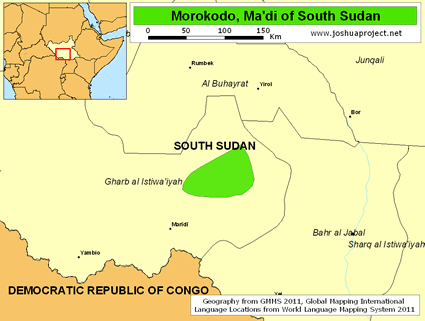The Morokodo, also known as Ma'di or Moro Kodo, are an ethnic group residing primarily in Western Equatoria State in South Sudan, particularly in the counties of Mundri West, Maridi, and Mvolo. They speak the Morokodo language, a Central Sudanic language within the Nilo-Saharan family. Although there are approximately 46,000 speakers, only a small fraction are native speakers, and the language is considered critically endangered.Historically, the Morokodo people have maintained a distinct identity from neighboring Moru clans, despite linguistic and cultural overlaps. Their oral traditions do not clearly trace their origins, but they possess a strong sense of ethnic pride and lineage.
The Morokodo are primarily agrarian, living in a tropical climate with fertile land and abundant rainfall. Their livelihoods revolve around farming, hunting, fishing, and beekeeping. They cultivate crops such as sorghum, groundnuts, simsim (sesame), tobacco, and shea nuts. Livestock such as goats, cattle, and poultry are kept in small numbers. The region is rich in natural resources, including hardwoods like mahogany and bamboo.Socially, the Morokodo live in clan-based communities with strong moral codes and traditions. Marriage customs emphasize chastity and respect for in-laws, with elaborate ceremonies marking the union. Birth and death rituals are deeply symbolic, involving seclusion, naming rites, and mourning periods that reflect gender distinctions.
The majority of Morokodo people adhere to ethnic religions, with approximately 85% practicing traditional beliefs. Christianity has made inroads, with an estimated 15% identifying as Christian, and 2–5% as evangelical believers. Catholic missionaries have translated portions of the Bible and produced prayer booklets in the Morokodo language, but a complete Bible translation is still lacking3.Traditional beliefs often involve ancestral worship, nature spirits, and rituals tied to agricultural cycles. Christianity is often syncretized with indigenous practices, and spiritual renewal remains a challenge.
The Morokodo people face several pressing challenges that impact their well-being and future. Spiritually, while some have embraced Christianity, many still lack access to discipleship and biblical teaching in their native language. Their language itself is critically endangered, and without urgent revitalization efforts, it risks extinction. In addition, rural isolation and limited infrastructure severely restrict access to basic healthcare and education. Although portions of the Bible are available in Morokodo, a full translation is still needed to support effective evangelism and spiritual growth. Economically, despite the region's rich natural resources, underdevelopment persists, and many Morokodo people continue to live in poverty.
Pray for the completion and wide distribution of a full Bible translation in the Morokodo language, for the rise of local leaders and evangelists to share the gospel in culturally relevant ways, for a spiritual awakening among those who blend traditional beliefs with Christianity, for the preservation of the Morokodo language and culture through education and community initiatives, and for improved access to healthcare, education, and clean water in Morokodo communities.
Scripture Prayers for the Morokodo, Ma'di in South Sudan.
AI generated by CopilotMorokodo language - WikipediaJoshua Project: Morokodo, Ma'di in South Sudan101 Last Tribes: Morokodo People
| Profile Source: Joshua Project |











